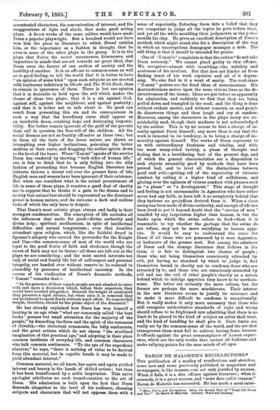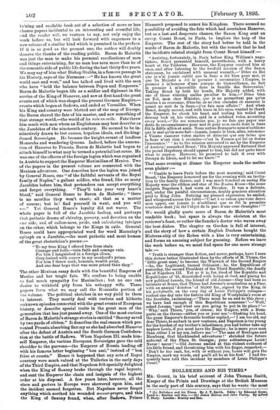BARON DE MALORTIE'S RECOLLECTIONS.* THE publication of a medley of
recollections and sketches. some new and some previously published in magazines and newspapers, is like treason,—an act only justified by success. When it fails, it is a dire offence against literature ; when it succeeds, it is a great success, and "none dare call it treason." Baron de Malortie has succeeded. He has made a most enter- • Here, There, and Everywhere : being the Second Part at "'Twist Old Time* and New." By Baron Sc Makrtie. London: Ward and Downey.
ta:ning and readable book out of a selection of more or less chance papers incidental to an interesting and eventful life, :,nd the reader will, we venture to say, not only enjoy the work before us, but will look forward with eagerness to a new volume of a similar kind which is promised in the preface. If it is as good as the present one, the author will doubly deserve the thanks of the reading public. Baron de Malortie was just the man to make his personal recollections of men and things entertaining, for no man has seen more than he of the romantic side of public life during the last thirty-five years.
We may say of him what Bishop Stubbs, in a famous passage in his History, says of the Normans :—" He has known the great world east and west," and has talked and lived with the men who have "held the balance between Popes and Emperors!'
Baron de Malortie began life as a soldier and diplomat in the service of the King of Hanover, and saw at first hand the great events out of which was shaped the present German Empire,— events which began at Sadowa, and ended at Versailles. When his King and country were blotted out of the map of Europe,
the Baron shared the fate of his master, and saw something of that strange world,—the world of les rois en exile. Fate threw him much with men whom an Englishman may best describe as
the Jacobites of the nineteenth century. He seemed to be in- stinctively drawn to lost causes, hopeless ideals, and dis-king- domed Sovereigns. He became the knight-errant of landless Monarchs and wandering Queens. Indeed, before the annexa- tion of Hanover to Prussia, Baron de Malortie had begun to attach himself to what may be termed a potential lost cause. He was one of the officers of the foreign legion which was organised in Austria to support the Emperor Maximilian of Mexico. Two of the papers in the present volume are connected with the Mexican adventure. One describes how the legion was joined by General Basco, one "of the faithful servants of the Royal family of Naples," a gallant soldier, who found, like so many Jacobites before him, that pretenders can accept everything and forget everything. "They'll take your very heart's blood," said General Bosco to Baron de Malortie ; "there is no sacrifice they won't exact; all that as a matter of course ; but lo ! find yourself in want, and you will soe." Yet General Bosco's loyalty did not waver. The whole paper is full of the Jacobite feeling, and portrays
that pathetic drama of chivalry, poverty, and devotion on the one side, and of callousness, pride, and calculating intrigue on the other, which belongs to the Kings in exile. General
Bosco could have appropriated word for word Macaulay's epitaph on a Jacobite,—the most pathetic and most human of the great rhetorician's poems :—
"To my true King I offered free from stain Courage and faith—vain faith and courage vain. For him I languished in a foreign clime, Grey-haired with sorrow in my manhood's prime. For him I threw rank, honours, wealth away, And one dear hope that was more prized than they."
The other Mexican essay deals with the beautiful Empress of
Mexico and her tragic fate. We confess to being unable to feel much sympathy for Maximilian ; but no one can desire to withhold pity from his unhappy wife. These papers form what we may call the Romantic portion of t he volume. The political sketches in no way yield to them in interest. They mostly deal with curious and hitherto
at nknown episodes connected with the great events of European history, or describe special traits in the great men of the
generation that has just passed away. One of the most curious of Baron de Malortie's strange stories is entitled "Saxony saved by two yards of ribbon." It describes the real reason which pre- vented Prussia absorbing Saxony as she had absorbed Hanover after the defeat of Austria and the South German Confedera- tion at the battle of Sadowa. When Napoleon III. made him- self Emperor, the various European Sovereigns gave the cold shoulder to the parvenu—the Emperor of Russia leading off with his famous letter beginning "bon ami," instead of "bon frere et cousin." Hence it happened that any acts of Royal courtesy were much valued at the Tuileries in the early days of the Third Empire, and that Napoleon felt specially delighted when the King of Saxony broke through the regal boycott, and sent the Emperor the chain and insignia of the highest order at his disposal. A few years later, however, all the stars and garters in Europe were showered upon him, and
the incident seemed forgotten. But Napoleon never forgot anything which soothed his wounded amour-propre, and this
the King of Saxony found, when, after Sadowa, Prince Bismarck proposed to annex his Kingdom. There seemed no possibility of avoiding the fate which had overtaken Hanover, but as a last and desperate chance, the Saxon King sent an envoy, Count Beust, to Paris, to implore the help of the Emperor. The rest of the story had better be told in the words of Baron de Malortie, but with the remark that he had the incidents related straight from Count Beust himself :—
"Arriving, fortunately, in Paris before King William's nego- tiators, Beust presented himself, nevertheless, with a heavy heart at the Tuileries. However, the Emperor received him at once, and after listening to the twofold mission of the Saxon statesman, he exclaimed with unusual warmth,—` Bites au Roi que je n'ai jamais oublie que la Saxe a ete bien pour moi, et que Sa Majeste a ete le premier a reconnaitro 1 Empire, le Premier a m'honorer d'une marque de bienveillance, au fait le premier a m'acceuiLlir dans la famine des Souverains.' Taking Beust by both his hands, His Majesty added, with one of those winning smiles peculiar to him,—' Bites bien an Roi, mon cher Ministre, clue je ne permettrai pas qu'on touche a sa couronne, dites-lut de no rien craindre et rassurez le quant au sort de la Saxe,—j'en fais mon .affaire !' And when Beust, deeply moved, and with tears in his eyes, wanted to thank the Emperor, he shook his head, and resting his veiled and dreamy look on his visitor, said in a subdued voice, accenting every word,—' No me remerciez pas, je no fais que payer une dett,e de reconnaissance pour moi et pour mon oncle dont la Saxe fat la fidele alliee et amie. Nous autres Bonaparte nous n'oublions que le mal qu'on nous fait—jatuais, jamais le bien, allez, retournez a Vienne rassurer votre maitre et dites-lui que son trine que in Saxe n'ont rien it craindre—c'est la France qui lui en donne Fassurance ! " As to the mission entrusted to me by the Emperor of Austria,' remarked Beust, His Majesty appeared flattered that the proud Hapsburg should appeal to him, but did not quite know what to answer. However, he promised to talk it over with Drouyn de Lhuis, and to let me know.'" That same evening at dinner the Emperor made the matter even plainer :— " Unable to leave Paris before the next morning,' said Count Beust, 'the Emperor honoured me for the evening with an invita- tion to the family dinner, and I was much touched on seeing His Majesty wear the ribbon and star of the R tuten Krone—the same insignia Napoleon I. had worn at Dresden. It was a delicate, and, under the painful circumstances, doubly gracious attention paid to King John. Noticing my pleased expression he smiled, and whispered across the table= C est it cc ruban que vous doves mon appui, car jamais je n'oublierai que ce fat la premiere courtoisie dont j'ai ete l'objet de la part dune cour etrangere ! ' " We would gladly quote more of Baron de Malortie's most readable book ; but space is always the skeleton at the reviewer's feast, or rather the Sancho's doctor who waves away the best dishes. The chapter on Gordon is full of interest, and the story of how a certain English Duchess bought the Mistress-ship of the Robes with a kiss is very entertaining, and forms an amusing subject for guessing. Before we leave
the work before us, we must find space for one more strange tale :—
" Truth is stranger than fiction, and never, perhaps, have I seen this dictum better illustrated than by the efforts of M. Thiers, the 'little great man,' to become the Warwick of the Second Empire —he, the Legitimist, turned Orleanist ; he. the Republican of yesterday, the second President of the Third Republic, the deadly foe of Napoleon III. Yet so it is, for, tired of the Republic and Republicans of '48, dissatisfied with being sh-lved, and pining for new political laurels, the friend of old Jerome—they had been so intimate at Rome, that Thiers had Jerome's nomination as a Peer, with an annual d4tation ' of 30,000 frs., signed by the King, in his port.feuille, on the very day of Louis Philippe's collapse— rushed one day into the festive old King of Westphalia's room at the Invalides, exclaiming,—' There must be an end to this farce ; we have had enough of this Republican nonsense ! Well,' asked Jerome, and what are you going to put in its place ? '— ' Why,' said Thiers, 'you, of course ; the Empire, with a Bona- parte on the throne—either you or your son.'—Shaking his head, the great Emperor's favourite brother replied,-6I am too old, my dear Thiers, to embark in new ventures, and Napoleon is too young for the burden of my brother's inheritance, you had better take my nephew Louis, if you must have the Empire ; he is more your man than either I or my son, believe me.'—' The man of Boulogne and Hamburg, that blockheaded adventurer !' shrieked the future autocrat of the Place St. Georges ; your saltimbanque Louis ! Never ! newer! '—Old Jerome smiled at this violent outburst of his little friend, and threatening him with his finger, remarked,— ' Don't be too rash, for, with or without you, Louis will gain the Empire, mark my words, and you'll all be at his feet.' I had fre- quently been told this incident by members of Louis Philippea Court."







































 Previous page
Previous page